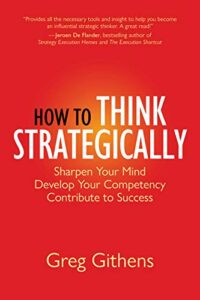
He outlines 20 “microskills” to help develop strategic thinking. Some of these may see obvious (curiosity, pragmatism) but others perhaps less so (devalourisation, metacognitivity). When starting to craft a strategy, he advises, “don’t begin with brainstorming clever answers: start with the hard work of finding the right questions.”
He introduces the concept of “pockets of the future”: present-day objects and behaviours that are presently not common but will have a large impact in the future – it the strategist’s role to tease out these subtle signals, investigate them, and if appropriate, initiate a strategic business initiative. He suggests postulating a hypothesis that an organisation’s current “story” (its strategy, its frame) is mediocre, and the strategist should use insight to replace this mediocre story with a better story.
The book is full of stories, techniques and observations. It is also entertainingly written and sparkles with quotations:
-
- “The success of the angel of dullness is based on your satisfaction with what comes to mind readily”.
- “Strategy involves making bets. No strategy can be guaranteed to succeed.”
- On new entrants at risk being stifled by corporate groupthink, “the cucumber gets pickled more than the brine gets cucumbered.”
A must-read for strategists and leaders; it repays close study and re-reading. I’ll leave the last words to Githens: “a strategic thinker who chooses not to practice leadership is functioning as an analyst. A leader who doesn’t think strategically is merely a cheerleader for operational efficiency.”